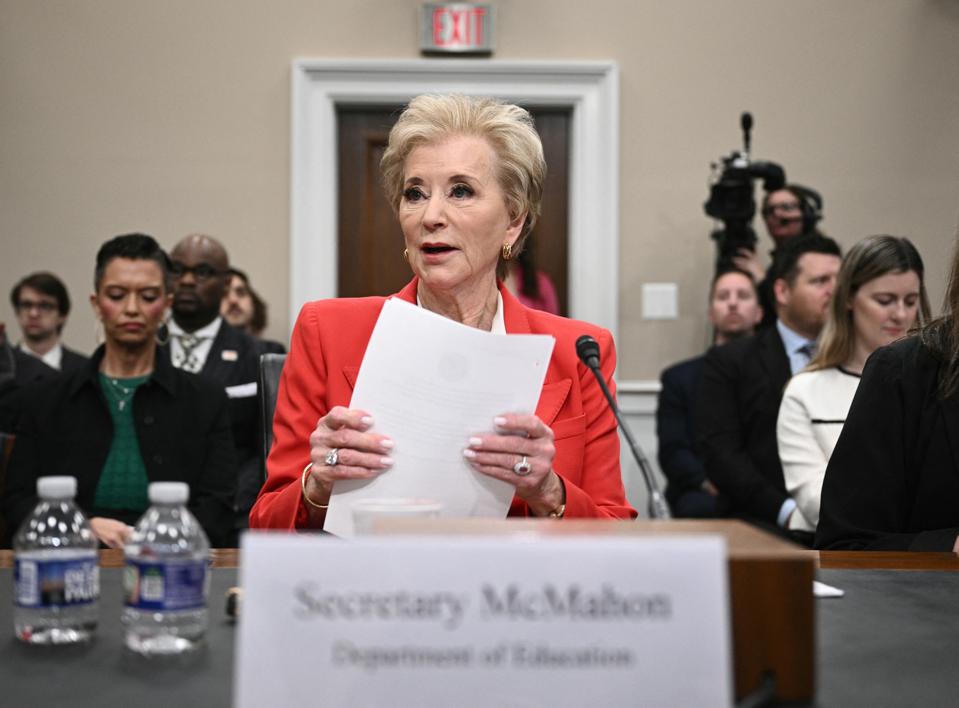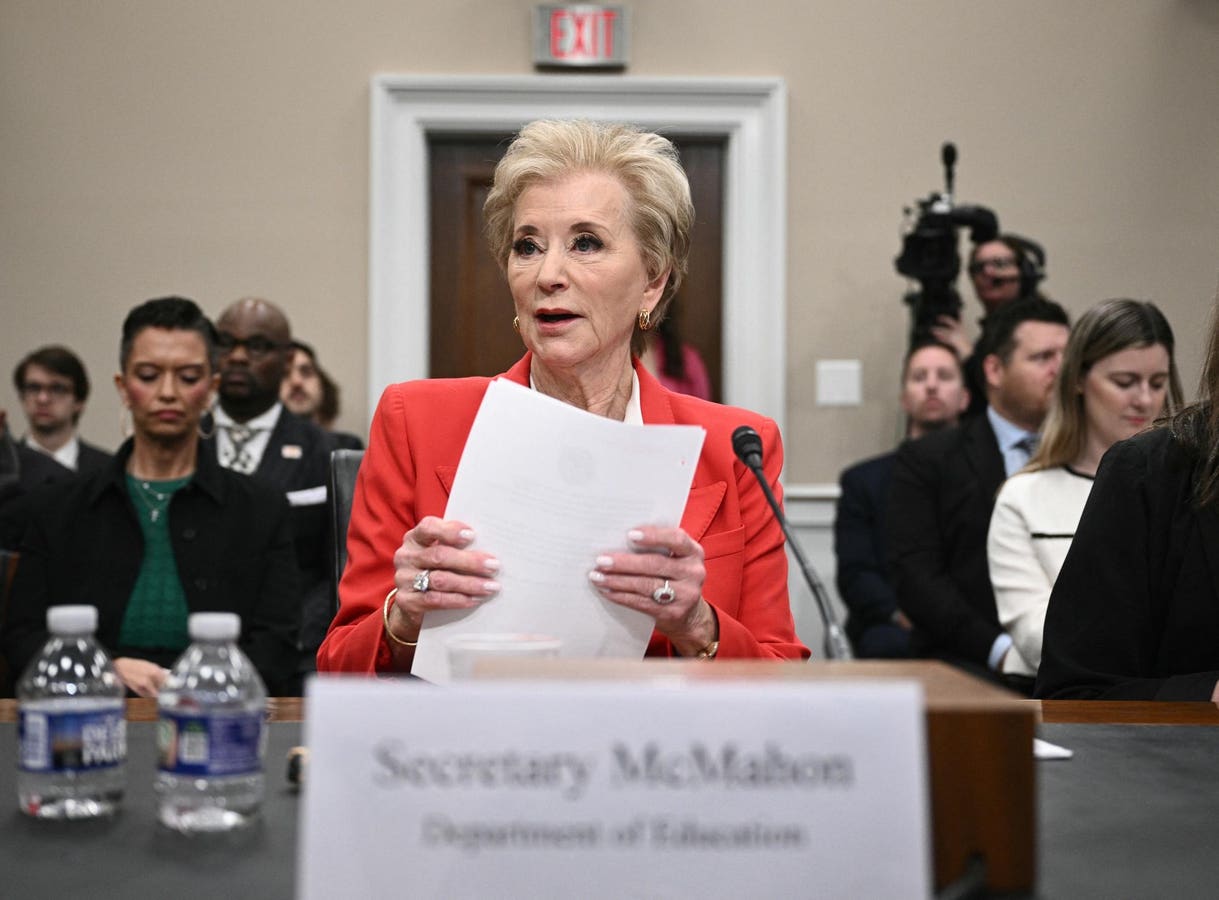
The proposed compact was accompanied by a letter from U.S. Secretary of Education Linda McMahon promising “multiple positive benefits” to institutions. (Photo by Brendan SMIALOWSKI / AFP) (Photo by BRENDAN SMIALOWSKI/AFP via Getty Images)
AFP via Getty Images
The Trump administration has asked nine prominent universities to agree to a set of conditions that represent many key features of the president’s conservative agenda for higher education. In exchange for signing on, the administration promised in an accompanying letter that the institutions would receive “multiple positive benefits,” including preferential treatment for receiving federal funds.
First reported by the Wall Street Journal, the 10-page “Compact For Academic Excellence in Higher Education,” outlines a broad set of principles pertaining to admissions, hiring, academic governance, athletics, foreign students, and campus speech that it wants the universities to endorse and monitor.
The Compact also contains this ominous statement: “Institutions of higher education are free to develop models and values other than those below, if the institution elects to forego federal benefits.”
The nine universities were: Vanderbilt University, Dartmouth College, the University of Pennsylvania, the University of Southern California, the Massachusetts Institute of Technology, the University of Texas at Austin, the University of Arizona, Brown University and the University of Virginia, a White House official said
While it’s not entirely clear how the nine schools were selected, May Mailman, senior adviser for special projects at the White House, told the WSJ that the administration saw them as “highly reasonable” institutions. “They have a president who is a reformer or a board that has really indicated they are committed to a higher-quality education,” said Mailman, who indicated that more universities will receive the memo in the future.
Here is a summary of the Compact’s key conditions.
1. Admissions
Universities would agree to not consider “sex, ethnicity, race, nationality, political views, sexual orientation, gender identity, religious associations, or proxies for any of those factors… explicitly or implicitly, in any decision related to undergraduate or graduate student admissions or financial support.” Exceptions would be allowed for institutions that are intentionally comprised of students of a specific sex or religious denomination.
All undergraduate applicants would have to take a standardized test, like the SAT, ACT, or CLT or a program-specific measure of ability in music, art, or other specialized programs of study.
2. Marketplace Of Ideas & Civil Discourse
Institutions would have to commit “to fostering a vibrant marketplace of ideas on campus,” requiring ”an intellectually open campus environment, with a broad spectrum of ideological viewpoints present and no single ideology dominant, both along political and other relevant lines.” Further, they would need to change or abolish “institutional units that purposefully punish, belittle, and even spark violence against conservative ideas,” and they would be required to adopt a policy protecting academic freedom in classrooms, teaching, research, and scholarship.
3. Nondiscrimination In Hiring
Institutions would not be allowed to consider factors such as sex, ethnicity, race, national origin, disability, or religion in “the appointment, advancement, or reappointment of academic, administrative, or support staff at any level, with exceptions as described in section 9 or otherwise provided by Title VII or other federal employment discrimination statutes.”
4. Institutional Neutrality
Institutions would need to maintain institutional neutrality, which was defined as requiring “policies that all university employees, in their capacity as university representatives, will abstain from actions or speech relating to societal and political events except in cases in which external events have a direct impact upon the university.”
Although these policies apply to all of the university’s academic units, including colleges, faculties, schools, departments, programs, centers, and institutes, “students, faculty, and staff, are encouraged to comment on current events in their individual capacities, provided they do not purport to do so on behalf of the university or any of its sub-divisions.”
5. Student Learning
Universities must commit to combatting grade inflation. “Signatories acknowledge that a grade must not be inflated, or deflated, for any non-academic reason, but only rigorously reflect the demonstrated mastery of a subject that the grade purports to represent.”
6. Student Equality
Institutions must “commit to defining and otherwise interpreting “male,” “female,” “woman,” and “man” according to reproductive function and biological processes.” Disciplinary standards must also apply equally to all students, faculty, and staff, regardless of “immutable characteristics.”
7. Financial Responsibility
Because universities “have a duty to control their costs,” “signatories to the compact would have to commit to freezing the effective tuition rates charged to American students for the next five years.
They also would be required to “refund tuition to students who drop out during the first academic term of their undergraduate studies.”
Any university with an endowment of more than $2 million per undergraduate student would agree to not charge tuition for students enrolled in hard science programs “with exceptions, as desired, for families of substantial means.”
Universities would be required to accept full transfer credits from the Joint Service Transcript of military service members and veterans enrolled in undergraduate and graduate programs and apply those credits to the requirements of general education and specific majors.
8. Foreign Entanglements
Among a list of conditions applying to transactions with foreign countries, the Compact requires that no more than 15% of a university’s undergraduate student population shall be participants in the Student Visa Exchange Program, and no more than 5% shall be from any one country.
Enforcement
A university’s president, provost, and admissions director would be required annually to certify the University’s adherence to the compact.
In addition, the institution would have to conduct an anonymous poll of its faculty, students, and staff that evaluates its performance under the compact. The results would be made public on the university’s website.
Adherence to the compact would be reviewed not by the Department of Education, but by the Department of Justice.
In addition, universities that “willfully or negligently violated this agreement shall lose access to the benefits of this agreement for a period of no less than 1 year. Subsequent violations of this agreement shall result in a loss of access to the benefits of this agreement for no less than 2 years. Further, upon determination of any violations, all monies advanced by the U.S. government during the year of any violation shall be returned to the U.S. government. Finally, any private contributions to the university during the year(s) in which such violation occurred shall be returned to the grantor upon the request of the grantor.”
Reactions
Most of the nine universities have not yet reacted to the proposal. The University of Texas was an exception. In a statement to the Texas Tribune, UT System Board of Regents Chair Kevin Eltife said “We enthusiastically look forward to engaging with university officials and reviewing the compact immediately,” he said. “Higher education has been at a crossroads in recent years, and we have worked very closely with Governor Abbott, Lt. Gov. Patrick and Speaker Burrows to implement sweeping changes for the benefit of our students and to strengthen our institutions to best serve the people of Texas.”
Eltife’s enthusiasm is not likely to be widespread among higher education leaders or faculty. The compact is problematic at several levels. Who will decide whether an administrator’s or faculty member’s speech amounts to belittling conservative ideas as opposed to legitimately criticizing them? And why is it just conservative ideas that are singled out for protection? Are liberal students or faculty never belittled on college campuses?
Why would open-admission universities be required to administer standardized admission tests? Will the government insist that a minimum test score be attained before a student can be admitted?
How many university leaders will be willing to commit to not raising tuition for five years? Who will decide when a grade is inflated? How will it be decided if a political statement made by a faculty member was in his or her individual capacity or was offered on behalf of the institution?
Why should an institution have to rebate the tuition of a student who decides to drop out for any of a host of reasons that have nothing to do with the quality of education being offered? How did the government arrive at a cap of 15% on international students, a level far below what many institutions have enrolled for years? Do institutions who sign such a compact waive the legal safeguards they have traditionally enjoyed? What is to prevent the government from amending the Compact with new, even more intrusive, requirements?
“Today it’s these things,” Ted Mitchell, the president of the American Council on Education, is quoted as saying in the New York Times. “Next week, it may be a whole new set. This is a power play, and it’s designed to divide the higher education community.” Mitchell described the threat of revoking funding as “the biggest waiver of institutional protections that I’ve ever seen.”
Pauline Strong, head of the UT-Austin chapter of the American Association of University Professors, urged her university to reject the deal.
“It trades autonomy for subservience, academic freedom for censorship, gender science and history for ideology, and the best interests of UT students and faculty for the favor of an administration intent on destroying our university,” Strong said in a statement to the Texas Tribune. “The requirements laid out in this letter will be the beginning rather than the end of the Trump administration’s demands of our institution. “

